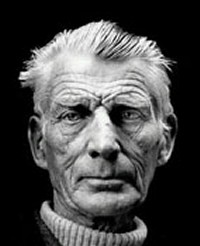Beckett is generally regarded as the most
important author in what is commonly referred to as the “Theatre of the Absurd”. The term, coined by Martin Esslin, refers to a group of dramatist
in the 1950’s “who did not regard themselves as a coherent group or as a
school, but who all seemed to share certain attitudes towards the
predicament of man in the universe”. Absurd means the dichotomy between man
and his life; in fact, for these dramatists the human being is a bewildered
person who is dipped in an immense and purposeless universe. Beckett renders
this conception through the anxiety, the solitude and the total
incommunicability, which are yielded by unreal situations and dialogues.
This new kind of drama seems to reflect the world of dreams and nightmares
of the subconscious mind. He chooses the French
language for its simplicity
and clarity, in according to his concept of reality that pervades all his
works: a radical pessimism based on perception of folly, dreariness and
meaningless of human life. The life, mysterious and incomprehensible, is
reproduced in language through silence, short and nonsensical dialogue and
through the repetitive and circular structure of the plot. In reality, in
“Waiting for Godot”, there is no plot, because nothing happen and there is
neither beginning nor conclusion; both acts start and end in the same way,
place and time. Beckett uses language like a barrier of the communication;
in fact, even if his language is simple and quite easy to understand, the
sentences have lost any logical meaning and have become merely a way of
passing time. Time is another important theme of the work, another example
of “absurdity”. All characters (Vladimir, Estragon, Lucky and Pozzo) are
worried about the passage of time even if there is no action. In the plot
there isn’t also any kind of moral message and this lack of meaning created
anxiety in the characters, an anxiety that is mainly hidden and that
manifests itself only through the character’s few actions. Like language and
actions, the stage is minimalist: a stylized tree, no more than a stem with
two or three leaves attached (in the second act become four or five), by a
country road. The road suggests the homelessness of the characters (Vladimir
and Estragon are tramps) and emphasizes the fact that they are going nowhere;
instead of providing shade and comfort, the tree inspires only
suicide, a
suicide that doesn’t happen. |
|
Percorso interdisciplinare di gaia millo anno scolastico 2004-2005 liceo scientifico "G.Oberdan" Trieste
|
